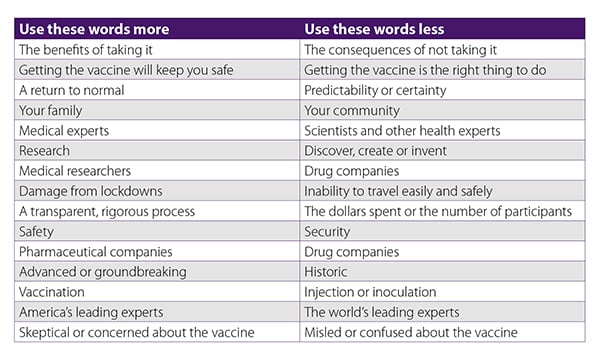To build COVID-19 vaccine acceptance, it is vital that physicians and health systems communicate effectively. This means using the right words, the right messengers and the right methods to reach diverse audiences. Findings from a national poll help inform physicians and others on the do’s and don’ts of communicating about COVID-19 vaccines.
A poll of 1,400 registered voters was conducted in December by the de Beaumont Foundation and famed pollster Frank Luntz in partnership with the American Public Health Association and others. The poll included an oversample of 300 Black and 300 Hispanic Americans. Each participant was polled on preferred words, sentences, phrases and attributes that would encourage them to consider getting vaccinated.
More than 60% of respondents chose the statement, “getting vaccinated will help keep you, your family, your community, the economy and your country safe and healthy,” as the most convincing. This was compared with 38% who chose the statement that “taking the vaccine is the right thing to do.”
The AMA offers a COVID-19 vaccines guide for physicians to help build trust in vaccine safety and efficacy. The AMA is also taking part in a major ad effort that seeks to help answer COVID-19 vaccine questions.
The words that matter
The most powerful motivator for vaccine acceptance is family. The poll found that significantly more Americans would be more willing to get vaccinated for their family instead of for their country, economy, community or friends.
Based on the poll findings, here is what the de Beaumont Foundation, a public health philanthropy, recommends on what to say—and avoid saying—when speaking about COVID-19 vaccines.
For example, an effective message would be, “These vaccines are extraordinarily effective at protecting you from the virus.”
Read about what doctors wish patients knew about COVID-19 vaccination.
Follow these tips
Beyond the do’s and don’ts of communication, there are some tips physicians and other health professionals should keep in mind. Remember to tailor messages for specific audiences while also explaining the benefits of getting the vaccine, rather than focusing on the consequences of skipping it.
It is also helpful to talk about the people behind the vaccine such as the scientists, health and medical experts, and the researchers. Avoiding judgmental language when talking about or to people who are worried about vaccination is also beneficial.
The AMA has published a resource to answer COVID-19 vaccine FAQs for physicians, along with a resource to help physicians and practice staff answer patient inquiries about COVID-19 vaccinations.




